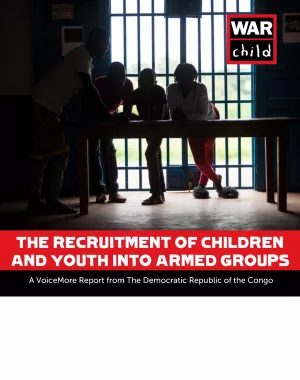Overview
VoiceMore is War Child’s youth-led advocacy programme which empowers young people affected by armed conflict to share their experiences and act to combat issues impacting them. War Child UK set up VoiceMore Masisi in 2020.
After completing their VoiceMore training the group decided to focus their project on the recruitment of children and youth into armed groups in the area. The young people felt the use of young people by armed groups was severely impacting children’s life chances and fuelling further conflict and attacks on communities.
Children and youth who join groups are at significant risk of injury, disablement, death, and psychological issues. While those who manage to leave face social exclusion and stigma in communities. The group felt that while children joined to try and meet basic needs or more opportunity, ultimately involvement was severely detrimental to both the young people and their families. The group also felt this form of exploitation has much wider impact at community level, as children are used to increase size of armed groups and carry out atrocities on behalf of leaders, leading to wider repercussions such as those outlined below:
- Increased insecurity in the region, which in turn causes displacement and reduces the possibility for development.
- High levels of violence in the community, as armed groups attach and loot villages to steal their livestock and possessions.
- Increase in sexual and gender-based violence, as members abuse others within groups and attack civilians.
- The creation of a sense of fear, stress, frustration and anger, which socially and psychologically impacts members of the community and relationships within the community.
The group designed and conducted their own qualitative research to find out more about what other members of the community thought about the issue and how to it could be prevented. Before starting this, the group first completed their VoiceMore research training and then worked together to decide on a research plan. They wanted to use data collection methods that could involve lots of different people in the community and would offer opportunity to hear in-depth people’s opinions, feelings and hope for change. For this reason, they opted for interviews and focus group discussions. In total the young people spoke to 278 people, including children, youth, parents, community leaders, civil society representatives, local authority representatives and some security personnel.
The group gathered feedback on what people felt was creating the problem, what current responses were like to help these young people, and what they felt could help stop recruitment and to better support children who leave. The group then analysed the data and developed a set of recommendations for local leaders, authorities, national government and the international community:
- Development and Provision of Community-Based ‘Transit and Orientation Centres’: These centers must be managed by local organizations who are supported by INGOs. Such centres would help young people leaving armed groups at a critical moment – as soon as they leave. They would be ‘one stop shops’ that would help welcome the young people, provide immediate advice and critical support (such as providing necessary documents to show they have left and family tracing), offer training and livelihoods opportunities, re-entry to education for younger children, recreational activities and psychosocial support to help erase the ‘mentality of the bush’.
- Encourage More Acceptance from Local Leadership: Encourage local leaders and authorities, such as the Chef de Groupement (chief of area), local chiefs, security services and other community leaders, to welcome associated children and youth back. If these leaders encourage acceptance of the children and youth, other members of the community will follow. As social acceptance is key for reintegration to work effectively, this would improve the possible of programming being more effective.
- More Support for Girls: Greater efforts should be made to identify girls’ leaving groups and support their reintegration. Girls must be offered both economic and social support. Training in different trades (not just ones traditionally deemed ‘female’), for example entrepreneurship would be useful. More emphasis should also be placed in programming to ensure the particularly harsh social stigma girls face is analysed and overcome.
- Uphold Existing Child Protection Law: The Department of Social Affairs Divisions, Gender, Family and Children Divisions should popularise and implement existing law on child protection within regions and localities. It is not as well understood as it needs to be. They should ensure local leaders and other local government departments and services (such as security and the police) fully understand and help uphold it.
- More Livelihood Support for Young People: More livelihood support, including vocational training, apprenticeships and skills building for children and youth is needed. Young people need more viable opportunities to learns skills and generate income. This would play a major part in preventing recruitment and re-recruitment in the area.
- Invest in Education: Greater investment is needed in education, including infrastructure. More schools need to be built and access to education improved for children. Providing more flexible learning options for older children and youth who have exited groups should also be developed and supported.
- Provision of Recreational Activities: While livelihood and education support should be main priorities, providing some recreational activities in programming and for other children and youth in the area would be beneficial, such as football, arts, creating ‘Child Friendly Spaces’ and other activities depending on the interests of local young people. Local NGOs, with support from INGOs and wider community, should lead this.
The report is available in English and French.
Download the full report to read more.

